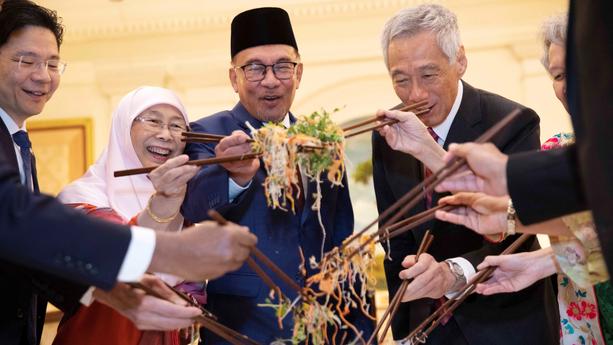Meeting between two close neighbors’ heads of govt is significant, will lead to stronger links, analysts say
 Malaysian PM Anwar Ibrahim (third from left) and Singaporean PM Lee Hsien Loong (fourth from left) mix a Chinese New Year dish, yusheng, in Singapore on Monday. (PHOTO / REUTERS)
Malaysian PM Anwar Ibrahim (third from left) and Singaporean PM Lee Hsien Loong (fourth from left) mix a Chinese New Year dish, yusheng, in Singapore on Monday. (PHOTO / REUTERS)
Malaysia and Singapore have welcomed the new year by holding a meeting between their two heads of govt, affirming what is perhaps the “most important relationship for both countries”, analysts said.
Malaysian Prime Minister Anwar Ibrahim arrived in the city-state on Jan 30, making his first state visit to Singapore since being appointed premier in November.
He met with Singapore’s Prime Minister Lee Hsien Loong and President Halimah Yacob. Anwar reaffirmed the longstanding and immutable friendship between the two countries, welcomed the reopening of borders and witnessed the signing of an agreement on the digital economy and the green economy and a memorandum of understanding on cooperation in personal data protection, cybersecurity and the digital economy, according to a statement issued by Singapore’s Ministry of Foreign Affairs.
“(The state visit is) significant since Singapore is Malaysia’s closest neighbor with strong trade and economic ties. Thousands of Malaysian workers cross the causeway every day to work in Singapore, which had been difficult during the pandemic,” said Azmil Tayeb, senior lecturer in the School of Social Sciences at Universiti Sains Malaysia.
The Johor-Singapore Causeway is a combined railway and motorway bridge that links the city of Johor Bahru in the south of Peninsular Malaysia to the district of Woodlands in Singapore.
“This is the first (state visit in Singapore) for Anwar as prime minister and is a good sign of positive relations,” said Bilveer Singh, associate professor of political science at the National University of Singapore.
James Chin, professor of Asian Studies at the University of Tasmania in Australia, said Anwar and Lee’s meeting is significant “as this is the most important relationship for both countries”.
Chin explained that as Malaysia is part of the Association of Southeast Asian Nations, Anwar’s first diplomatic tour needed to be to a member country of ASEAN before he goes on a diplomatic tour elsewhere. This is why Anwar visited Brunei and Indonesia — a few weeks before his visit to Singapore.
But Chin noted that Anwar’s visit to Singapore goes beyond the ASEAN connection. It also highlights the close relationship between the two countries. Singapore and Malaysia are not just geographically close (the state of Johor in Peninsular Malaysia is bordered by the city-state), the two countries’ histories, economies, cultures and politics are intertwined.
Chin said this meeting is symbolic as it is the first face-to-face meeting of the two leaders since the pandemic. It is also a prelude to the Singapore-Malaysia Leaders’ Retreat — the last one was held in April 2019. He said the retreat could serve as a venue for the two countries to thrash out significant issues like construction progress on the Johor Bahru-Singapore Rapid Transit System or increasing direct flights between East Malaysia and Singapore.
Lee has invited Anwar to visit Singapore again for the Singapore-Malaysia Leaders’ Retreat in the second half of 2023. He is also scheduled to go on a state visit to Malaysia in March.
Anwar said the two countries need to try and do their utmost to enhance bilateral relations. He said that apart from issues related to trade, investment and security, both sides could also work on food security.
Alicia Garcia Herrero, chief economist for Asia Pacific at Natixis, welcomed Anwar’s state visit to Singapore, noting that the signing of agreements on the green economy and the digital economy is “great news” for the two countries.
“My sense is that Malaysia will see a boom in Singaporean (foreign direct investment) in these sectors. Singapore needs a backyard for its green transition as well as production of semiconductors” and Malaysia is well placed, she said. The agreements will also allow Singaporean companies to diversify their investments.


